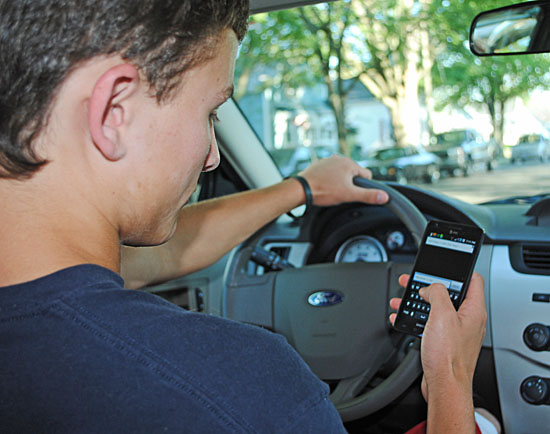Lots of opinions on state texting ban
CINDY WOOD/independent feature writer

OMG! Icnt blev we cn gt pulled ovr fr txtin now! SMH! :o!
Look like a foreign language? It’s not. Welcome to text speak, the international language used by millions of “texters” each and every day. For those not up to date on the latest acronyms, the above sentence reads, “Oh my God! I can’t believe we can get pulled over for texting now! Shaking my head!”
Teenagers might in fact be shaking their heads, but supporters of Ohio’s recently enacted texting while driving ban might be breathing a sigh of relief. With a signature from Gov. John Kasich recently, Ohio recently joined 38 other states in enacting legislation concerning distracted driving. While the law won’t go into effect for about three months, it’s generating a lot of buzz, both locally and statewide.
Marabeth Null of Scott said it’s a step in the right direction. “All teenagers do it, but I’m glad there’s now a law against it,” she said. “Getting caught could be the added incentive that some of the kids need. But then again, when we were teenagers, we got in trouble for speeding, reckless op, running stop signs, the works. Hopefully, though, it taught us to be better drivers and take more responsibility for our actions.”
The ban seeks to contain and control the devastating effects of distracted drivers. According to the National Highway Traffic Safety Administration, sending or receiving a text takes a driver’s eyes from the road for an average of 4.6 seconds. The NHTSA likens it to driving the equivalent of a football field at 55 miles per hour — while blind.
Scary? It is, when you consider the latest statistics that show the dramatic impact distracted drivers have had on the motoring public. The impact is much more powerful on young drivers, who are oftentimes inexperienced, and think “it will never happen to me.”
But it can, and does, on many occasions. Studies have shown that 11 percent of all fatalities involving drivers 20 years of age or under were caused by distracted driving. In addition, nearly half of all American teenagers say they have been present in a car when the driver has been texting, which creates a crash risk up to 23 times more than driving while not districted.
Local drivers offer conflicting opinions about the law, but most agree it’s in the best interest of public safety. Once it goes into effect August 30, drivers under the age of 18 will be prohibited from using any form of electronic device while driving. Teenagers can be ticketed if they are caught using an electronic device. For adult drivers, however, the citation will be a secondary offense, meaning they can only be ticketed if they were pulled over for a different offense first.
The law offers several exemptions, though, and allows any driver on the road to text or use their phones in an emergency, or when the driver has pulled off to the side of the road. Adults can still use hands-free devices, and adults and teenagers can both use GPS devices, as long as they are not typing or manipulating directions while driving.
Stephonie Knittle of Van Wert wholeheartedly agrees with the texting ban, especially for young drivers, but she questions the validity of the ban on talking on the phone while driving. “I agree with the no texting law, especially for young drivers, but the law about talking on the phone while driving … I don’t agree with,” she said, adding “plus, you would have to get the police officers themselves to quit talking when driving as well. I see that a lot!”
Danielle Knittle, a graduate of Van Wert High School, is now a resident of Columbus, where texting while driving is already illegal. She admits to texting while driving, and thinks enforcement of the law will become an issue.
“It’s just like the law saying 17-year-olds can’t have more than one person in the car,” she said. “Nobody listens to that law and I have never heard of anyone getting pulled over for it.”
She also wonders if the ban will include law enforcement personnel. “How can they enforce this when most of the law enforcement talk on their phones or use their computer in their cruiser while driving?”
Regardless of opinions, the law will go into effect in late August, at which time drivers will have six months to become acclimated to it. During that grace period, authorities will issue warnings and provide information on the new ban to those found in violation.
The Fraternal Order of Police has spoken in favor of the ban, as have several other statewide organizations. Even still, some motorists see it as Big Brother encroaching on their rights. Chris Sensabaugh of Van Wert said the ban could have the opposite effect lawmakers are hoping for.
“When we were younger, if our parents told us not to do something, you can bet I was the kid who would do just that because I was told no,” she noted. “It was kind of a cheap thrill to see if I could get away with something.”
Sensabaugh did add that her own thoughts have changed as she has matured. “Now that I’m older, I have more respect for certain situations, but are they going to pass a law that says you can’t put make-up on, eat, smoke or talk to your passengers while you drive?”
While Null agrees with the legislation, she said enforcement needs to start at home, not in the Statehouse. “They need to stop dumbing things down for people and passing laws about it. Who doesn’t know not to play with electricity near water?,” Null said. “Who doesn’t know that coffee from McDonald’s is going to be hot? People need to learn, not just be spoonfed their whole lives.”
POSTED: 06/18/12 at 5:38 am. FILED UNDER: News







